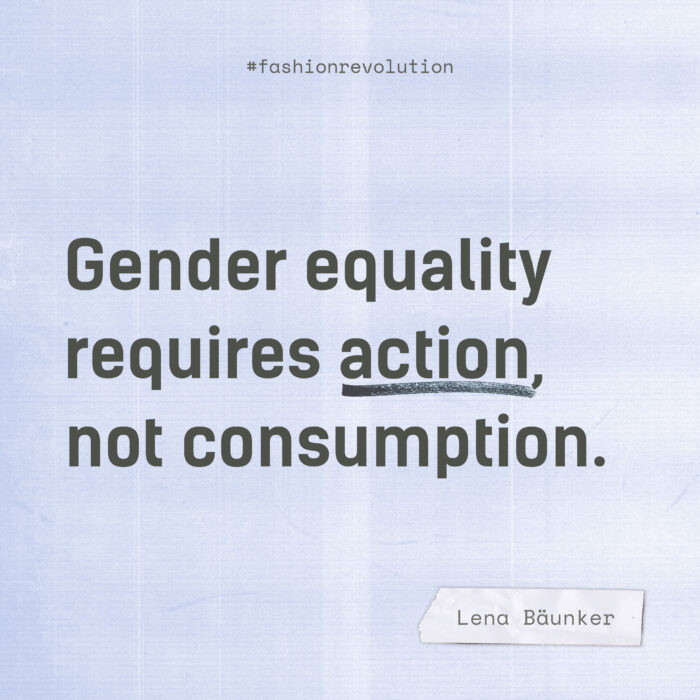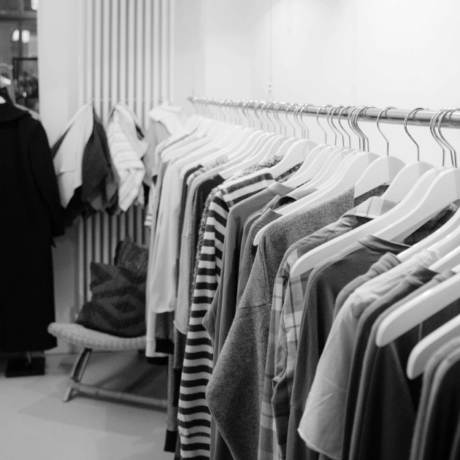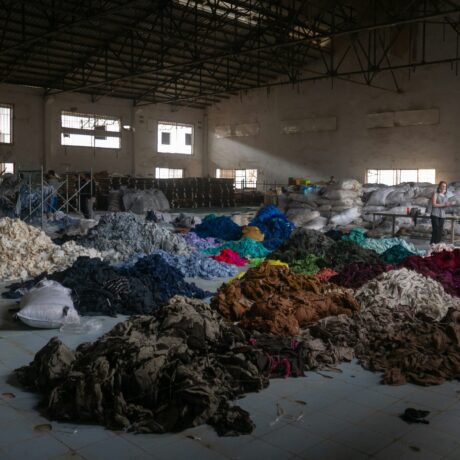Is your feminist t-shirt really feminist?
“We should all be feminists”, “women will change the world” and “girl power”: It’s slogans like these that fashion brands shout down from t-shirts and sweaters. They want to empower women. But what if that empowerment is based on exploitation?
It is encouraging to see what feminism is achieving today: From Hollywood’s #metoo movement to Finland’s all-female coalition government – calls for women’s empowerment and greater gender equality are everywhere.
We live in a world that is still far from gender equality, with women experiencing oppression and discrimination on a daily basis. Many of these problems are being tackled, sometimes with success. During the past two years, women in Saudi Arabia have been allowed to drive legally, abortion has been decriminalised in Chile and Ireland, Taiwan has become the first Asian country to legalize same-sex marriage and Tanzania’s top court has ruled that marriage under the age of 18 is unconstitutional. Fashion Revolution’s own research finds that the fashion industry is also making progress: In 2019, 63% of brands analysed in the Fashion Transparency Index disclosed policies on closing the gender pay gap at company level. That’s a 24% increase from the year before. Figures like these demonstrate the importance of a feminist movement that persistently takes action for women’s empowerment and pressures the powerful for change. It’s this pressure that exposes institutional responsibilities and prompts companies and governments to take the necessary steps for establishing gender equality.
Fashion Empowerment
Fashion is often at the forefront of massive cultural movements, political sentiments and societal shifts. When women took to Washington to protest an anti-feminist president, their symbol was the Pussyhat. And when the #metoo movement took on Hollywood, it spurred fashion collections from brands high and low celebrating the fierceness of womanhood. Fashion is the visual manifestation of the zeitgeist.
It seems like fashion brands have understood the importance of empowering women. Slogans like “We should all be feminist”, “Girl Power” and “The future is female” shout down from their t-shirts and sweaters. They dress people all over the world and help them express their feminist convictions. And one who slips into one of these t-shirts does indeed feel its effect: It makes you feel empowered and vocal. The t-shirt serves as a canvas for your personal beliefs, as a tool for expressing your identity. This empowering effect of clothing is remarkable, and important. We need to feel strong to speak up and make our voices heard. The problem is the focus tends to shift away from how inclusive this empowerment is.
View from the supply chain
Since the birth of movements like #metoo and HeForShe, the increased popularity of Women’s Marches worldwide and the growing recognition of inequality in general, feminist merchandise is high on demand. Brands are quick to respond to these public developments: They create, market and sell a mass-produced t-shirt literally overnight. Too often, the origins of these tees are far from feminist. According to the Clean Clothes Campaign, 70-80% of garment workers worldwide are women. They are frequently subject to discrimination as well as verbal, physical and/or sexual abuse. In a study conducted by CARE International, nearly 1 in 3 female garment factory workers reported experiencing sexual harassment in the workplace over a 12-month period. The Garment Worker Diaries project has found that 60% of interviewees experienced gender-based discrimination. Over 15% reported being threatened and 5% had been hit. Furthermore, their research revealed that female workers are often exposed to verbal abuse from their supervisors and rely on income from their husbands or other household earners to meet their financial obligations.
And while, as mentioned above, the Fashion Transparency Index finds companies are addressing gender inequality in their corporate offices, they find little action is being taken further down the supply chain. The 2019 FTI revealed that of the major fashion brands, only 37.5% of brands disclose capacity building projects in the supply chain focused on gender equality or female empowerment. Only 14% publish best practice guidance in the supplier code of conduct on issues facing female workers in the supply chain. Furthermore, brands do not seem to grant workers the right to voice their dissent: While 77% of brands publish a policy on freedom of association, right to organise and collective bargaining in their Supplier Code of Conduct, only 40.5% disclose how they actually put their policies into action. And, research from IndustriALL finds that 90% of garments workers worldwide have no possibility to negotiate their wages or conditions.
Inclusivity is key
The bottom line: Fashion brands exploit women in one part of the world to empower them in another. A t-shirt meant to empower female customers is made by women for whom gender inequality is still the day-to-day reality. This empowerment of the few through the exploitation of the many is a dynamic that often gets overlooked in the fashion industry.
It’s this intersectionality that makes the empowerment promoted through feminist t-shirts exclusive and transforms feminism into a source of profit. But women’s empowerment should not be a slogan or marketing campaign. If brands truly want to execute equality, then inclusivity is key. Brands need to include all women and not just focus on those with enough bargaining power to buy a new t-shirt every other month. That doesn’t mean consumers have to stop wearing feminist tees. It means that those of us who are fortunate enough to celebrate our feminism sould raise our voices for the women around the world who make our clothes. Like generations of feminists before, you can use your empowerment as a base to push for further change. Ask the brand: Who made my clothes? How do you make sure she doesn’t experience discrimination or verbal, physical and sexual harassment? Gender equality requires action, not consumption.









